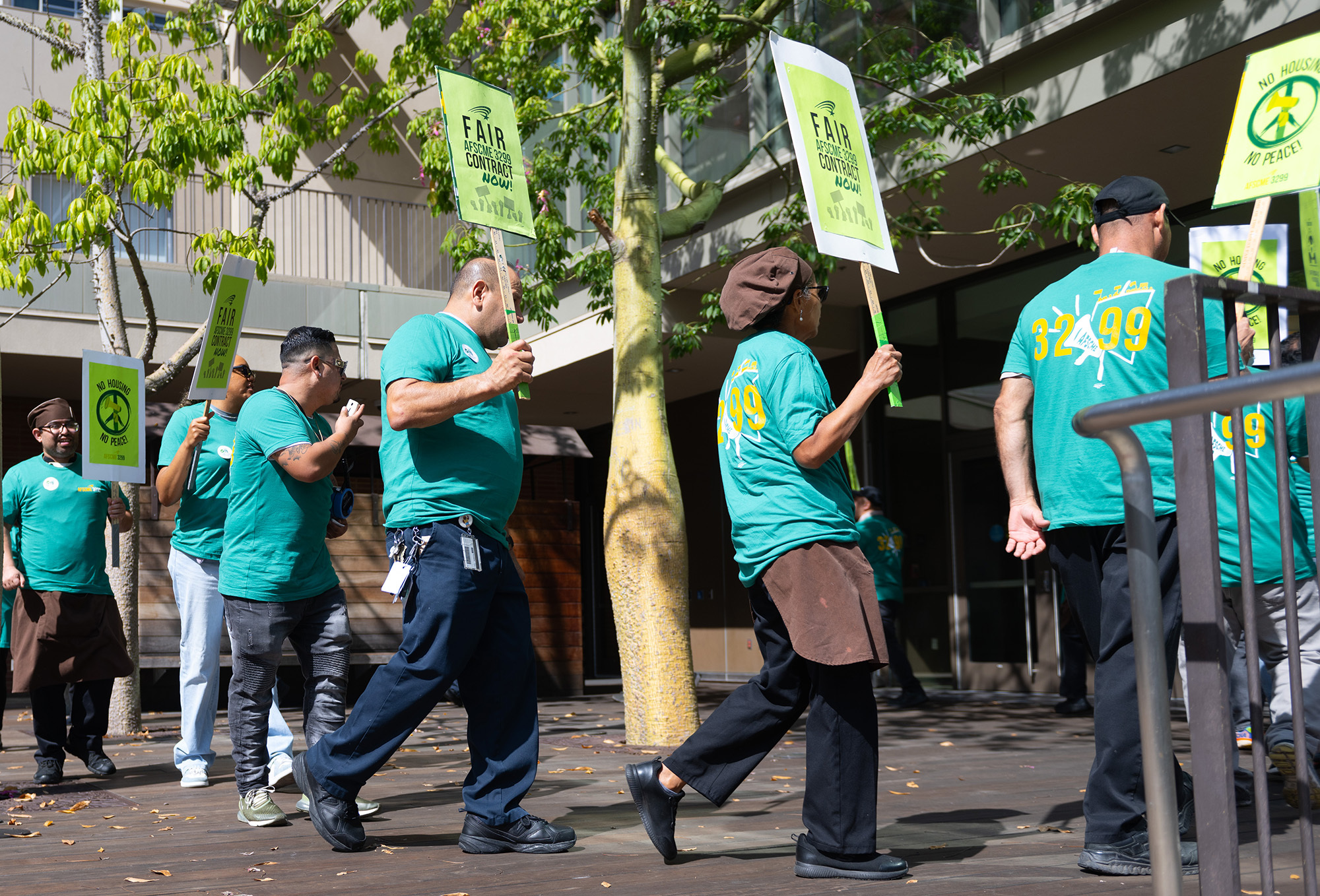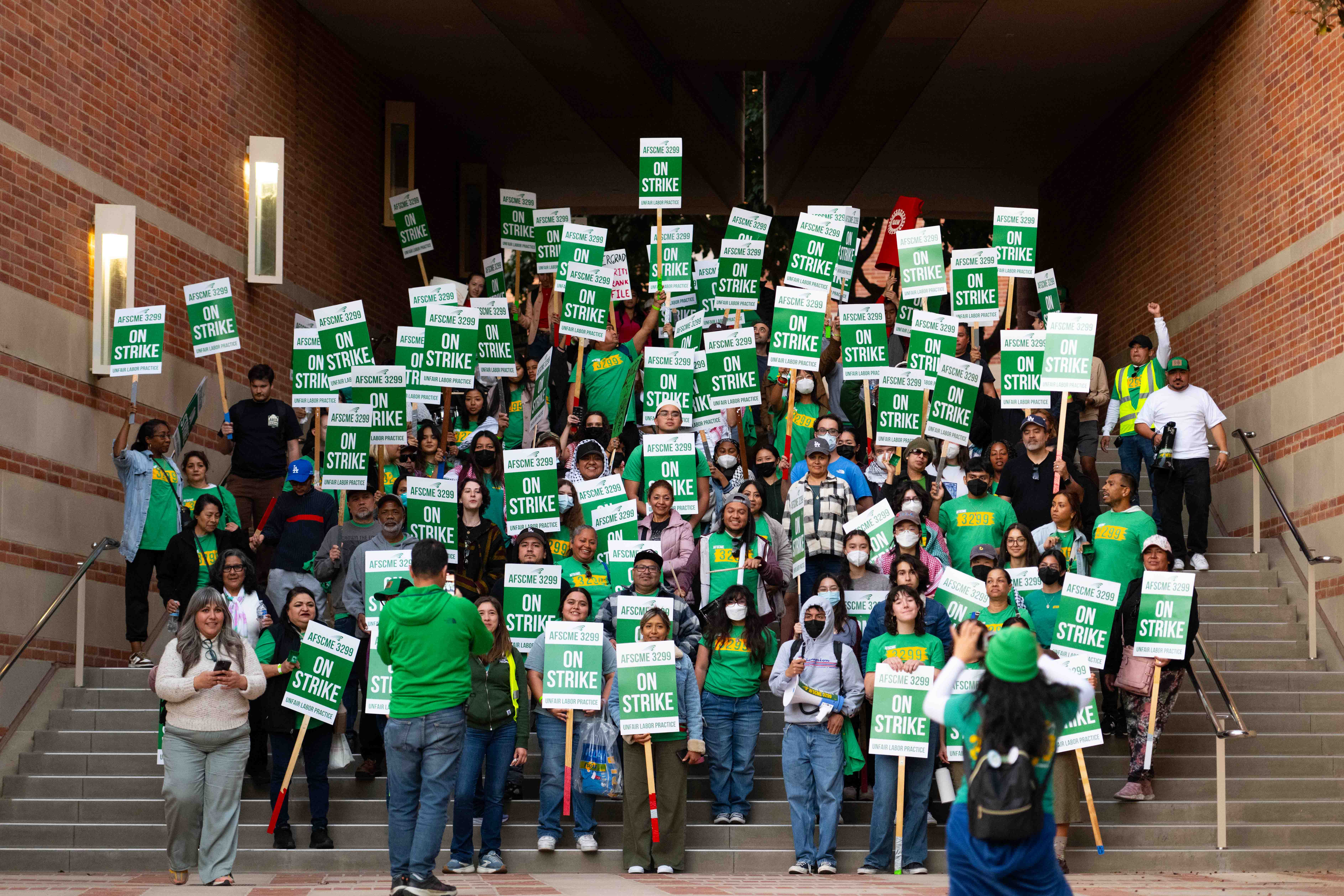Thousands of workers from AFSCME 3299 and UPTE-CWA 9119 to strike across UC
Bernie Sanders speaks at a 2019 rally for the University Professional and Technical Employees-Communications Workers of America 9119 and the American Federation of State, County and Municipal Employees Local 3299. UPTE-CWA 9119 and AFSCME Local 3299 will strike across the UC starting Wednesday. (Daily Bruin file photo)
By Alexandra Crosnoe
Feb. 26, 2025 1:22 a.m.
Two unions have called on nearly 60,000 workers to strike across the UC starting Wednesday.
The American Federation of State, County and Municipal Employees Local 3299, which represents patient care, service and skilled craft workers, called for its second strike against the UC this academic year for Wednesday and Thursday. University Professional and Technical Employees-Communications Workers of America 9119, which represents researchers and technical workers, will also strike from Wednesday to Friday.
UCLA Housing said in a Monday email that it will consolidate dining locations and adjust menus in response to AFSCME 3299’s strike. Bathroom cleaning schedules will also be modified, and some carriers may not deliver mail to UCLA, housing staff added in the email.
Bruin Plate, Bruin Café, Café 1919, Rendezvous, The Study at Hedrick, The Drey and Epicuria at Ackerman will close Wednesday and Thursday, according to the UCLA Dining website. Reggie Kumar, a UCLA Housing and Hospitality spokesperson, said the university will consolidate dining halls, offer less food options and use food trucks during the strike.
All UCLA Health facilities will remain open and operational, according to the UCLA Health website. However, picketing, particularly around Ronald Reagan UCLA Medical Center, could cause traffic delays, according to the website.

While the two unions are not working together, they have experienced similar issues with the UC at the bargaining table, said Dan Russell, UPTE-CWA 9119’s president, in a Monday press conference. AFSCME 3299 began contract negotiations in January 2024 – five months before UPTE-CWA 9119 – and neither union has reached a contract agreement with the UC, he added.
[Related: UPTE-CWA 9119 to conduct 3-day strike against UC at end of February]
Todd Stenhouse, a spokesperson for AFSCME 3299, said the University has failed to address the affordability and staffing crisis many union members faced during bargaining, while members of the UC administration have received pay increases.
The UC Office of the President said in a statement on the social media platform X that they believe unions have failed to engage in “productive bargaining.” UCOP also alleged in the statement that UPTE-CWA 9119 did not attend its most recent bargaining session, while AFSCME Local 3299 has not responded to the University’s proposals since May.
“Both unions have chosen to focus their energy on strike preparation and amplifying misinformation rather than negotiating in good faith,” the statement said.
Stenhouse also alleged that the UC “bypassed” the bargaining process to impose higher health care rates on union members, worsening the affordability crisis.
“Many are sleeping in their cars. Many are having to commute two and three hours each way to work,” he said. “Workers raise these issues and are told to sit down and shut up.”
Low pay contributes to union members leaving their jobs for other opportunities, Stenhouse added, which exacerbates vacancy issues.
“Instead of having one person devoted to your building, now you have one person devoted to four buildings,” he said. “There’s a real effect here – it increases the possibility of mistakes. It increases the possibility of injuries on the job.”
UPTE-CWA 9119 also cited a vacancy crisis among its departments as a main reason for striking. However, a spokesperson for UCOP said these claims were untrue – and that head counts are actually increasing across the UC.
Max Belasco, a co-chair of UPTE-CWA 9119’s UCLA chapter, said the UC recently acquired nine hospitals, which could account for net increases in staff rates. He added that he believes UCOP’s statistic does not illustrate the staffing issues faced by on-the-ground workers.
“We’ve had countless testimonies from our members about the fact that they have been doing the work of two, three additional people because positions in their worksite have gone empty,” Belasco said. “I don’t think you can just look at head count and then be able to say immediately that because it’s increased, there isn’t a problem.”
Belasco added that the UC can work toward resolving this crisis by beginning to bargain in good faith. Members of the UC’s negotiating team have shown up to sessions disengaged, often arriving hours late and looking at their phones during the union’s presentations, he said.
Shawn Singh, a nurse case manager at UC San Francisco and member of UPTE-CWA 9119, said in Monday’s press conference that the vacancy crisis forces patients in the emergency room to wait “multiple days” to receive care.
“Patients are staying longer. They’re getting insurance denials because they’re staying longer,” he said at the conference. “It really creates the recipe for burnout, moral distress and poor quality of patient care.”
Michael McGlenn, a psychologist at UC San Diego and member of UPTE-CWA 9119, also said in the press conference that UCSD students in psychological crises who seek care at Counseling and Psychological Services often have to wait weeks for treatment because of the staffing crisis across the UC.
“Imagine that you have someone that you love that might be going through one of the most difficult moments of their lives,” he said. “What kind of support would you want for them?”
Both unions have also called the strike in response to the UC’s implementation of policies they say restrict speech.
In an unfair labor practice charge filed to the California Public Employment Relations Board on Feb. 10, AFSCME 3299 alleged that the UC “unilaterally” enacted new speech rules without allowing the union to bargain over them.
The ULP charge also claims that during the union’s November strike, the UC threatened discipline and arrest for those who broke these rules, including by using bullhorns and not seeking approval to picket in certain locations at UCLA.
“UC workers engaged in this quintessential strike and expressive activity to protest UC’s bad-faith bargaining and as part of their fight to improve their declining wages and to get UC to address housing unaffordability and rising staff vacancies,” the ULP charge said. “Rather than doing so, UC has responded by violating AFSCME’s access rights and threatening its own workers with penalties and arrest.”
[Related: AFSCME Local 3299 announces strike against UC for Feb. 26, 27]
Stenhouse said the restrictive speech policies have made union members afraid to speak out against alleged unfair labor practices.
“The collective bargaining process is about two parties coming to the table in good faith to address each other’s concerns,” he said. “Imagine one of those parties says … ‘I’m going to threaten you if you go out onto a picket line.’ Your job may be at risk. These things have a chilling effect.”
UPTE-CWA 9119 also filed an unfair labor practice charge with PERB in January regarding these speech policies.
In the charge, the union denounced UCLA’s newest Time, Place and Manner restrictions, which place limitations on the use of amplified sound, leafleting and protesting to areas around Bruin Walk and outside Murphy Hall.
UCLA could be set to change its policies governing expression in March, according to minutes from a meeting between campus administrators and student stakeholders.
[Related: UCLA set to revise Time, Place and Manner policies, expand public expression areas]
Russell also said in the press conference that the University used intimidation against UPTE-CWA 9119 members. He further alleged that the University lied to workers during its November strike at UCSF, telling them they had to come into work because of urgent patient needs but then gave them routine staffing duties.
Stenhouse said UCLA students have given AFSCME 3299 “incredible” support, adding that they have a unique understanding of the union’s work.
“Students have been very supportive, both because they interface with the workers who are on the front lines every day, whether it’s at the cafeteria or in their dorm or at a hospital,” he said. “There’s also a certain understanding of the issues at stake.”

Tiara Monemi, a first-year physiological science student, said she noticed reduced dining hours and dirty bathrooms during AFSCME Local 3299’s November strike.
Helen Padilla Hernandez, a first-year pre-human biology and society student, said she supports the strike but added that November’s dining hall closures were expensive for her, as she had to spend money on food.
“When you think about another one (strike), you’re like, ‘Well, is something going to change?’” she said. “You also worry about the people who don’t know … and who don’t have food prepared for them or supplies.”
Students in Saxon Suites received an email Tuesday saying their restrooms would not be cleaned during week eight.
Belasco said he hopes the strike allows the UC community to recognize the work of these two unions.
“If you take a look at the situation, both of us, our unions, really want to fight for making it affordable to be a UC worker and live near a UC campus,” he said. “I’m hoping that, at the very least, that together, we’ll be heard.”
Contributing reports by Josephine Murphy and Sam Mulick, Daily Bruin staff.
